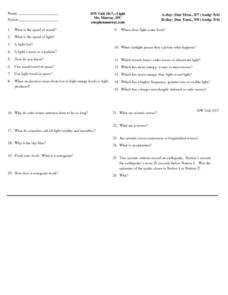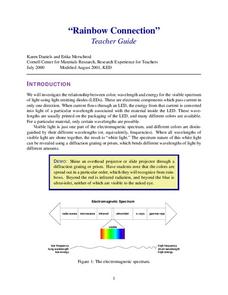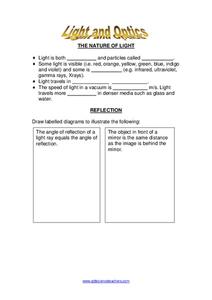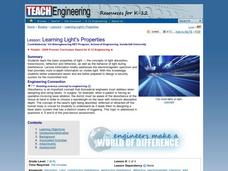Curated OER
HW Unit 10:7-Light
In this light worksheet, students answer twenty six questions about sound and light and how they both travel. They also answer questions about different types of waves in the electromagnetic spectrum such as radio waves, visible light,...
Cornell University
LEDs Rainbow Connection
View LED lights through the eyes of a scientist. Young scholars learn to view light as a wave frequency and connect various frequencies to different colors on the light spectrum. A lab activity asks groups to measure the frequency of...
NASA
Supernova Chemistry
By measuring the wavelength, frequency, and intensity of electromagnetic radiation, scientists determine the temperature, density, and composition of far away items. Scholars rotate through ten lab stations using a spectroscope at each...
McGraw Hill
Blackbody Radiation Interactive
Noting the color of a star is equivalent to taking its temperature! A creative lesson describes the connection between a star's temperature and the color it emits. As pupils interact with a simulation, they learn how to connect the...
Curated OER
Light and Optics
In this science worksheet, students look for the words to fill in the crossword puzzle that is focused upon the concepts of light and optics.
Curated OER
Light and Optics
In this light and optics worksheet, 11th graders fill in 7 blanks about the nature of light, draw 9 diagrams to illustrate reflection, refraction, lenses and color.
Curated OER
Light 2: The Lighter Side of Color
Students explore light and color, including how colors are mixed to produce new colors, how light is filtered, and how light is reflected off of surfaces.
Curated OER
Check Out Lights and Shields with Beads
Students explore Ultraviolet detecting beads and conduct several investigations with them. In this investigative lesson students participate in an experiment to see the harmful effects of UV light and discuss their findings.
Curated OER
Catch a Wave. . .
Part of a larger online space science website, this page has a brief explanation of electromagnetic radiation and a chart of wavelengths as compared to common objects. There are four questions to answer about the information. This can be...
Curated OER
Light & Crystals
Students observe a demonstration of light refraction. They experiment with disappearing crystals to further study light refraction.
Teach Engineering
Thirsty for Gold
In the last portion of the six-part unit, teams perform an experiment with gold nanoparticles to determine which sport drink has the most electrolytes. The nanoparticles are used as chemical sensors and fluoresce in different wavelengths...
Curated OER
Learning Light's Properties
Students examine the properties of light and the behavior of light during interference. In this electromagnetics lesson students explain behaviors of light.
University of Texas
Multi-wavelength Astronomy
Explore a land far, far away with a well-designed lesson that examines electromagnetic imaging as a way to obtain information about galactic structures. Learners begin to see the importance of looking beyond the visual spectrum to...
Curated OER
Let the Sunshine in
Students collect and analyze data to study wavelengths of visible light. They cover Styrofoam cups with three different colors of sun filtering products and shine a lamp directly on the cups. They determine the most effective filtering...
Curated OER
Remote Sensing and the Electromagnetitc Spectrum
Fifth graders conclude that each color of the spectrum has a different amount of thermal energy by measuring temperature with a thermometer. They infer that there is an invisible band of the spectrum by measuring temperature beyond the...
International Technology Education Association
Make a Pinhole Camera
With a little light and a lot of time, you can create some amazing images. This NASA-related task instructs pupils to build a pinhole camera. The lesson provides suggestions for different pictures to try with the pinhole camera...
Curated OER
Colorful Colorado
Students investigate the components of white light as viewed through a prism. The multiple colors of the spectrum produced are related to wavelengths and experienced through the creation of a color wheel.
Curated OER
What's the Frequency, Roy G. Biv?
Students examine the concept of frequency and wavelength. They analyze how frequency and wavelength relate to each other by conducting an experiment involving measuring and timing wavelengths by pulling adding machine tape through an...
Urbana School District
Optics
Don't worry, optics is a light topic! The presentation covers reflection, refraction, fiber optics, mirages, prisms, rainbows, dispersion, mirrors, lenses, telescopes, diffraction, the human eye, and much, much more. Presentation is...
National Nanotechnology Infrastructure Network
Jell-O® Waveguide and Power Loss
Jell-O® can help model the transmission of light through fiber optic cables. Young scientists use the jiggly dessert to make a waveguide to transmit a laser beam from one point to another. Their models help them learn the function...
PBS
Electromagnetic Spectrum | UNC-TV Science
Illuminate lightwaves, even those not visible to the human eye, in a concise activity about the electromagnetic spectrum. Pupils watch and listen to an animated video describing the electromagnetic spectrum as well as frequency and...
Curated OER
Water Prism
Students using a glass prism filled with water are able to see all of the visible colors found the sunlight.
Urbana School District
Waves
What is a physicist's favorite part of sports? Doing the wave. The presentation covers longitudinal, transverse, surface, and standing waves. It includes in-depth information on frequency, wavelength, period, amplitude, reflection,...
Beyond Benign
Electron Transitions
Ready for a lab with a lot of razzle-dazzle? Young chemists observe flame tests of common salts through an always-popular activity. The updated resource focuses on observation skills, collaboration, and green chemistry practices.

























